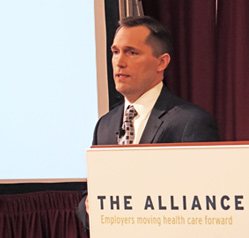
Employers Urged to be Proactive in Complying with ERISA Part 7
The Affordable Care Act (ACA) impacts self-funded employers’ fiduciary responsibilities, which increases their chances for an audit or investigation by the Employee Benefits Security Administration. External Link. Opens in new window. (EBSA) of the U.S. Department of Labor (DOL).. External Link. Opens in new window.
Nathan Johnson, senior technical advisor – health for the DOL’s Chicago Regional Office – EBSA, prepped employers on health plan investigations at The Alliance Learning Circle on ACA compliance on March 26, 2014 at Monona Terrace.
“For the purposes of the ACA, you may be a fiduciary and sometimes that is a shocker,” Johnson told attendees. The definition of a fiduciary includes any person that has discretionary control or authority over plan administration or management.
Focusing on Complying with ERISA Part 7
Johnson focused on complying with ERISA Part 7 of the Employee Retirement Income Security Act (ERISA), the federal law that governs self-funded health plans. Part 7 addresses employers’ fiduciary responsibility under the ACA.
Fortunately, the DOL offers the 57-question “Self-Compliance Tool for Part 7 of ERISA” to help employers understand their responsibilities before a health plan investigation occurs. Johnson urged employers to look at the rules and then use the self-compliance checklist. If problems occur, employers can follow the correction guidelines provided with the checklist.
Many breaches can be corrected under EBSA’s Voluntary Fiduciary Correction Program (VFCP). That process allows the company to correct some types of violations before the DOL investigates. If the corrections are made properly, the company receives a “no-action” letter from the DOL.
Employer Documentation
Employers should expect to supply these documents in EBSA investigations:
- Plan document/Summary Plan Document (SPD)/Certificate of Coverage
- Summary of Benefits and Coverage (SBC)
- Service provider contracts
- Premium schedules
- Documents related to plan finances
- Documents related to claims
- Various HIPAA notices and other notices
- Various other documents related to Part 7 compliance.
- EBSA can also issue subpoenas to obtain additional documents.
Health Plan Investigations
Johnson noted that EBSA also encourages voluntary corrections during the investigation process.
EBSA’s Health Benefits Security Project is currently ramping up health plan investigations, also known as health plan audits. These investigations focus on three areas:
- ACA compliance.
- Compliance with other ERISA Part 7 requirements, including the Health Insurance Portability and Accountability Act (HIPAA), wellness program rules and other areas.
- Scams masquerading as multi-employer welfare arrangements (MEWAs) and offering “too good to be true” premiums. The scam is typically revealed when the “entrepreneur” running them moves on, leaving unpaid claims behind.
Employers learn of investigations when they receive a telephone call from an investigator, followed by a confirmation letter scheduling an initial interview.
During that interview, Johnson said EBSA focuses on the basic operations of the plan, such as whether it is self-insured, has “grandfathered” status under the ACA, has provided all the proper notices to employees and keeps claims payments up-to-date. The employer plays a crucial role by providing documents that help EBSA determine whether the plan is complying with regulations.
Concluding the Investigation
Quite often, Johnson said the investigation ends when a company receives a closing letter stating no problems were noted. When problems occur, companies can often fix them while the investigation is still underway, which eases the process.
If problems are found and were unresolved during the investigation, EBSA will send the company a Voluntary Compliance Letter telling them what must be fixed to bring the plan into compliance. EBSA strongly encourages companies to take voluntary action to fix problems.
“When you get the letter, call the assigned investigator and they will walk you through exactly what we want to be fixed,” Johnson said. If the corrections are not made, cases are referred to the solicitor’s office.
Be Proactive
Throughout the process, Johnson urged employers to feel welcome to call EBSA for compliance assistance and ACA questions related to issues such as wellness plan design. By being proactive in identifying issues and making corrections, employers can help keep the emphasis on voluntary compliance instead of mandated corrections.
[box]
Learn More about Complying with ERISA
Compliance Assistance
Chicago Regional Office
U.S. Department of Labor – EBSA. External Link. Opens in new window.
312.353.0900
Office of Health Plan Standards & Compliance Assistance. External Link. Opens in new window.
202.693.8335
When breaches occur, the employer can be held liable and the employee responsible for overseeing the program can be held “personally liable,” Johnson said. Penalties are imposed by the Internal Revenue Service (IRS) and can be as high as $100 a day.
[/box]







